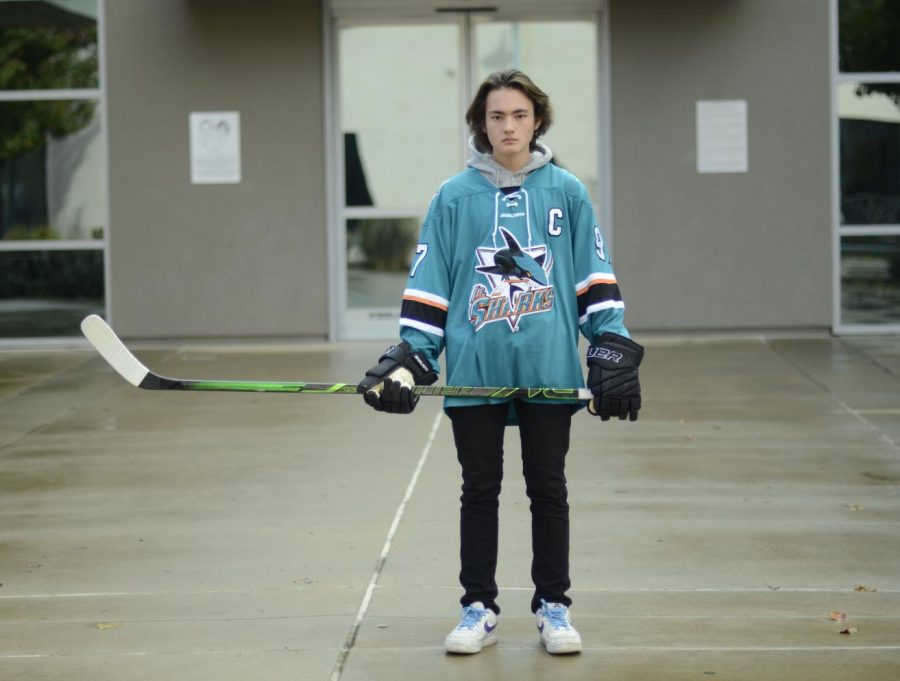Humans of Harker: Keys to a captain
Ryan Brown (12) develops leadership qualities through ice hockey
“It’s okay to lose, but it’s not okay to lose and not give it one hundred percent. If you lose and you feel there’s nothing else that you think you could have done differently and you played a good game, then that’s okay and you can learn from that and grow and try to win the next one. The goal should always be to win, but there’s also value in losing. If you lose a game, but you feel you could have done more and you didn’t leave it all out on the table, then there’s definitely something that needs to be changed,” Ryan Brown (12) said.
The players empty from the bench and gather together for a one-minute intermission as the period concludes with a buzzer. Their coach motions to the team, advising them on ways to improve their game. As the captain of his team, Ryan Brown (12) adds to his coach’s speech with tips and suggestions on their performance. Rested and invigorated, Ryan and his team steam out to center ice for another fifteen minutes of hockey.
“As captain, I don’t see myself as better than my teammates, I see myself as just another member of the team,” Ryan said. “Yet, as captain, I think it’s important to be able to implement what my coach wants. If he wants us to be in order, it’s important for me to relay that to the rest of the team. It’s important for me to be an extension of my coach.”
Ryan learned how to skate when he was four, then began playing hockey when he was six following his dad who played college hockey. In the 2019-20 season, Ryan played 18 and under tier two for the Jr. Sharks. Ryan is the captain of his team, and with that title believes certain responsibilities are associated with it.
“Being a captain means representing the team as a whole but at the same time also instituting my coach’s orders and relaying them to the rest of my teammates,” Ryan said. “There’s a balance between being a player and having to know when to [act like a coach].”
Personal accountability and responsibility are key values that Ryan, as captain, has a duty to uphold for his team; he knows that without it, teams become disorganized and hectic.
“As captain of my team, [holding myself accountable] is an important thing to do. It sets an example for the rest of my teammates; because if I can’t hold myself accountable what does that show to the rest of my teammates and what example does that set,” Ryan said.
Along with demonstrating leadership and being able to direct plays, Ryan’s friend Giovanni Rofa (12) comments on Ryan’s less obvious duties as a captain.
“He’s a very active team member, he likes to be the guy who riles people up for games,” Giovanni said. “He has a large voice on the team and has told stories of where he brings the team in for huddles for pre-game speeches.”
Ryan’s coach, Jorge Murillo, further comments on Ryan’s ability in a leadership role. Jorge personally believes that Ryan displays a similar mindset towards his own coaching style and thus saw him as a suitable captain for his team.
“Having coached Ryan for the last five years [as a Head Coach] and the two years before that [as an Assistant Coach], Ryan has shown year after year the ability to help deliver the ‘coaching’ message I want to convey to the rest of the Team,” Murillo said. “Ryan uses his leadership to keep the team driving toward the common goal.”
Ryan believes as captain he has a responsibility to be the link between the coach and the rest of the team and that he has a real connection to his coach.
“My coach and I think in a similar mindset – [we’re] both very driven to win. It’s okay to lose, but it’s not okay to lose and not give it one hundred percent. If you lose and you feel there’s nothing else that you think you could have done differently and you played a good game, then that’s okay and you can learn from that and grow and try to win the next one. The goal should always be to win, but there’s also value in losing,” Ryan said. “If you lose a game, but you feel you could have done more and you didn’t leave it all out on the table, then there’s definitely something that needs to be changed.”
By trying to demonstrate captain-like qualities while playing hockey, these qualities are recognized by other people, like his friend Jack Connors (12), in day to day life.
“He’s just a person everyone looks to when things are shaky,” Jack said. “When people are unsure, he’s the guy with the straight forward plan.”

Carter Chadwick (12) is the co-photo editor of the TALON Yearbook, and this is his fourth year on staff. He aims to raise the book on a photographic level...


















![“[Building nerf blasters] became this outlet of creativity for me that hasn't been matched by anything else. The process [of] making a build complete to your desire is such a painstakingly difficult process, but I've had to learn from [the skills needed from] soldering to proper painting. There's so many different options for everything, if you think about it, it exists. The best part is [that] if it doesn't exist, you can build it yourself," Ishaan Parate said.](https://harkeraquila.com/wp-content/uploads/2022/08/DSC_8149-900x604.jpg)




![“When I came into high school, I was ready to be a follower. But DECA was a game changer for me. It helped me overcome my fear of public speaking, and it's played such a major role in who I've become today. To be able to successfully lead a chapter of 150 students, an officer team and be one of the upperclassmen I once really admired is something I'm [really] proud of,” Anvitha Tummala ('21) said.](https://harkeraquila.com/wp-content/uploads/2021/07/Screen-Shot-2021-07-25-at-9.50.05-AM-900x594.png)







![“I think getting up in the morning and having a sense of purpose [is exciting]. I think without a certain amount of drive, life is kind of obsolete and mundane, and I think having that every single day is what makes each day unique and kind of makes life exciting,” Neymika Jain (12) said.](https://harkeraquila.com/wp-content/uploads/2017/06/Screen-Shot-2017-06-03-at-4.54.16-PM.png)








![“My slogan is ‘slow feet, don’t eat, and I’m hungry.’ You need to run fast to get where you are–you aren't going to get those championships if you aren't fast,” Angel Cervantes (12) said. “I want to do well in school on my tests and in track and win championships for my team. I live by that, [and] I can do that anywhere: in the classroom or on the field.”](https://harkeraquila.com/wp-content/uploads/2018/06/DSC5146-900x601.jpg)
![“[Volleyball has] taught me how to fall correctly, and another thing it taught is that you don’t have to be the best at something to be good at it. If you just hit the ball in a smart way, then it still scores points and you’re good at it. You could be a background player and still make a much bigger impact on the team than you would think,” Anya Gert (’20) said.](https://harkeraquila.com/wp-content/uploads/2020/06/AnnaGert_JinTuan_HoHPhotoEdited-600x900.jpeg)

![“I'm not nearly there yet, but [my confidence has] definitely been getting better since I was pretty shy and timid coming into Harker my freshman year. I know that there's a lot of people that are really confident in what they do, and I really admire them. Everyone's so driven and that has really pushed me to kind of try to find my own place in high school and be more confident,” Alyssa Huang (’20) said.](https://harkeraquila.com/wp-content/uploads/2020/06/AlyssaHuang_EmilyChen_HoHPhoto-900x749.jpeg)



